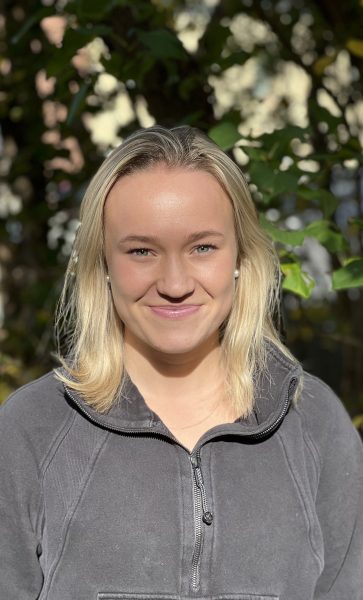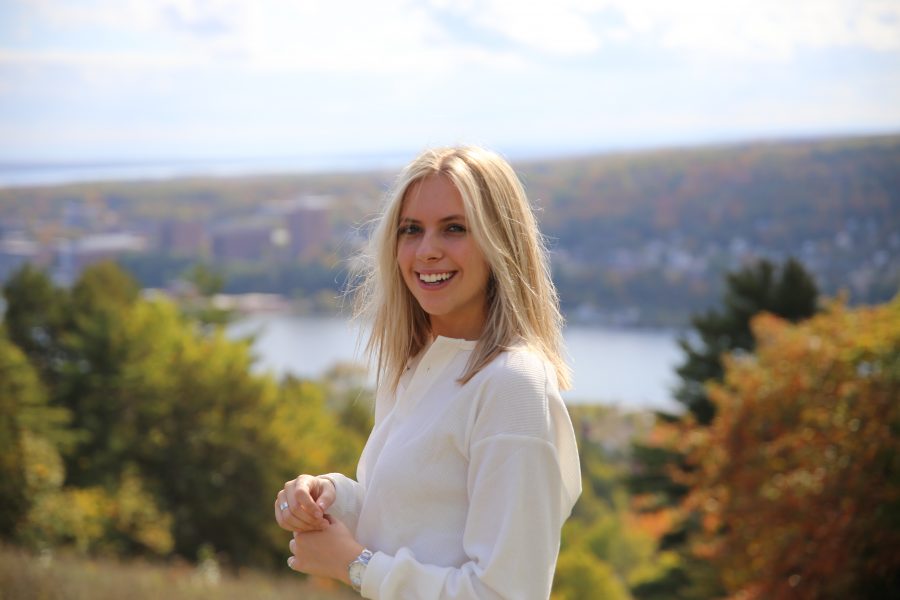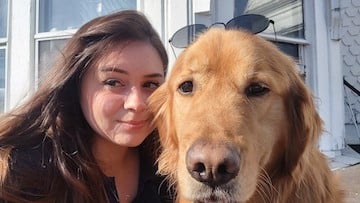
Grace Gonzalez ‘23, BS—Medical Lab Science, started her vet school journey with a minor in pre-health professions. She recently enrolled at Cornell University’s College of Veterinary Medicine. We had a chance to catch up with Grace to learn more about her pre-veterinary journey. Grace discussed her interest in veterinary medicine, the application process, undergraduate research, her advisers, and her advice to pre-professional health students.
Why did you choose to study MLS at Michigan Tech?
When I initially came to Michigan Tech, I was unsure of what I wanted to do. As a matter of fact, upon graduating high school, I did not even plan to attend college. I felt behind my peers and I’m sure that others in this position may feel the same way. However, I think that coming into college undecided is a wonderful thing. It allows you to explore your passions without committing to something right away. Michigan Tech turned out to be a place that fostered my passions and allowed me to flourish.
Upon beginning my first semester at Tech, I was enrolled in the Exploring Majors class (SA 1000). Our professor encouraged us to dig into our passions and what majors Tech offers. I don’t know how she knew but right off the bat, she recommended Medical Laboratory Science. I looked into this major a little more and was instantly intrigued. I always had an interest in medicine and I wanted a major that guaranteed me a job after graduation, had a meaningful and direct impact on society, and allowed me to continue my education if I desired.
As I continued in MLS, I found myself enjoying the classes immensely but I felt that something was missing. I started the Aquarium Society at Michigan Tech and volunteered with the local wildlife rehab in my free time. During this time I was considering the medical school route but never felt 100% about it. I loved the medicine and patient care aspects but I wanted to incorporate my interest in aquatics and exotic animals somehow. Initially, I thought that maybe I could do some research during medical school that used animal models, but then I thought, if I love animals so much, why wouldn’t I just pursue veterinary medicine?
Why did you choose to enroll in pre-health professions at Michigan Tech to start your vet school journey?
As stated before, I never saw myself going to college, let alone becoming a Doctor of Veterinary Medicine. I had a rough childhood and always felt like my low socioeconomic status, lack of support, and my experiences with a mental health crisis would make it impossible for me to move up in our society. When I came to Michigan Tech, all of my preconceived notions about what my future would look like were changed.
My professors and advisors were so supportive and all of my peers were on the path to achieving great things. I saw mountains of opportunities around me and this motivated me to push myself harder.
As soon as I declared Medical Laboratory Science as my major, I knew I wanted to do more. I loved my major so much that it encouraged me to pursue medicine further but I certainly needed some guidance on how to get there. I knew nothing about the application process, how to choose schools, the interviews, or how to gain meaningful experiences. This led me to the pre-health professions minor.
Why are you interested in veterinary medicine?
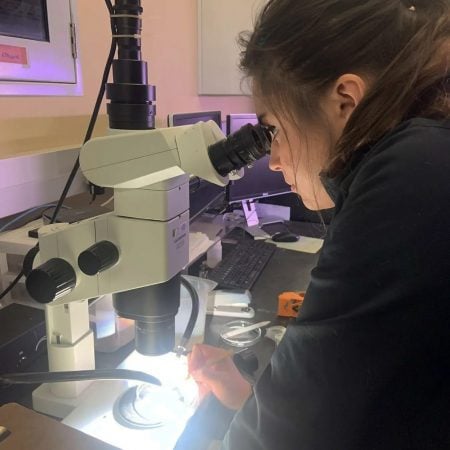
For anyone applying to veterinary school, medical school, or other graduate schools, you know that they want you to write about “Why this profession?” in about 3000 characters. That is so hard! There are innumerable things that have grown my passion for veterinary medicine over these past few years but there are a few themes that stand out.
I would say that the motivation that first encouraged me to pursue veterinary medicine was to improve the care given to aquatic and exotic animals. As I delved into the fishkeeping world, it became very apparent that we don’t know a lot about aquatic animal medicine and a lot of the information pet stores give out on non-dog and cat animals is driven by profits rather than the animals’ needs. Unlike many people who may see a fish as a decoration, I was able to spend enough time with them to know that each fish has a unique personality and feelings. To spread awareness of proper and ethical care of aquatic animals, I started the Aquarium Society at Michigan Tech, which has created a space for aquatic enthusiasts to converge and teach others. I also began to work with Drs. Casey Huckins and Jill Olin on aquatic research, which is something that I will be continuing in veterinary school.
As I began to get more involved in veterinary medicine, I realized that my life experiences were exceptionally relevant to this field – mostly my experience with the suicide of someone close, and my heritage. The Veterinary profession has one of the highest suicide rates and recently an initiative called Not One More Vet has emerged to help combat it. As I move through my career in veterinary medicine, I make it a priority to be an advocate for a healthy environment, checking on my coworkers, and teaching non-veterinary people about the issues vet med faces.
About my heritage, half of my family is from Guatemala, which has a rate of over 75% of the population living below the poverty line. This understandably lends itself to many stray animals, minimal veterinary care, and a lack of concern for conservation. As I move forward in my veterinary career, I will be making an effort to use my skills to improve veterinary medicine in impoverished countries, such as Guatemala.
Last but not least, I just genuinely enjoy everything about veterinary medicine. Even though I am very passionate about aquatic and exotic animals, other fields of veterinary medicine are equally interesting to me. From surgery to research, laboratory work, talking to owners, and everything in between, I am always learning new things and I feel like I have the ability to positively impact animal and human lives. Figuring out what is wrong with an animal and how you can treat it is like a high-stakes puzzle that is very rewarding when you have successful results.
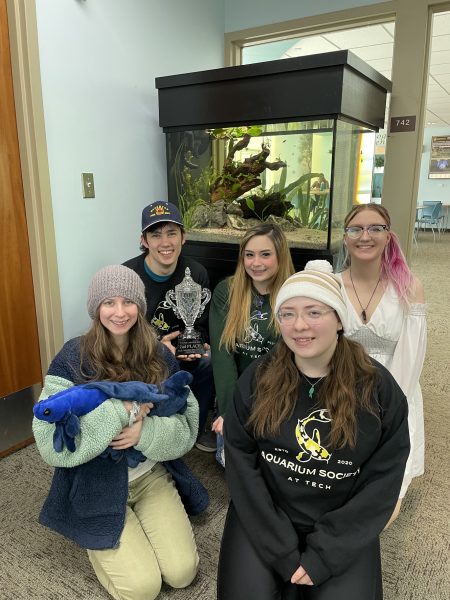
What kinds of things have you done to prepare yourself for a career in veterinary medicine?
Veterinary medicine is a double-edged sword. As passionate as I am about it, I made sure to get enough experience to really understand what I was getting into. It is a stressful field, with high burnout rates, not very profitable, and loans are necessary. However, even knowing and experiencing these things did not sway my passion.
A few of my favorite experiences while preparing for my application were doing a fish research project with Dr. Huckins, starting the Aquarium Society, working as a vet assistant at Copper Country Vet Clinic, volunteering at a local beef farm, shadowing our local pathologist for autopsies, taking care of lab animals, and being active within the biology department. These experiences were never just a box to check, but instead really valuable opportunities to expand my knowledge and try new things. Each one ensured me that I was on the right path for my future.
For those preparing for a graduate school path, I would say the biggest things to focus on are shadowing or working hours, engaging in leadership roles, diversifying your experiences, and most importantly, finding what you are passionate about.
Veterinary school acceptance rates are around 10-15% in the US. Congrats! You are one of the fortunate ones. What factors do you think made your application so successful?
I feel exceptionally fortunate and relieved to have had such a successful cycle. I applied to 5 schools and was accepted to three, interviewed at two but pulled out when I was accepted to my top choice – Cornell. Maybe some statistics majors can chime in on how crazy that is!
However, I can say with certainty that my success in the application process was not luck. There were many long days of school, working, studying, research projects, volunteering, and more. Dr. Huckins, my research advisor, might say that I did a little too much, but I genuinely enjoyed everything I was doing and it was all a great experience for vet school.
I think the biggest factor in my application’s success was that each part of my application showed my genuine passion for veterinary medicine. From my personal statement to my experiences to my supplemental essays, I believe I made it show how motivated I was to pursue aquatic medicine and research.
What were some of the factors you considered when applying to vet school?
First, I was not limited geographically. As someone who grew up in the Midwest, I felt like I wanted to try something different. I considered schools down south and on both the east and west coasts. I was drawn to aquatic veterinary medicine.
I looked at the websites of programs I was interested in, exploring all the different things they had available there for veterinary students. As I wanted to do research, I was particularly interested in the professors. What types of research were they doing? What did they publish? I reached out to professors personally to learn more. They talked about the ins and outs of their programs. Many gave me student contacts. I spoke to their students to learn more about life on campus and in the lab. These conversations were invaluable to making my decision.
I looked at program schedules, too. I wanted to determine if I could complete a PhD during vet school. Typically, vet school is four years (three years of classes followed by a year of rotations in clinics and zoos). Afterward, I’d have to take exams to get licensed and look for a job. Residency is optional, too. A PhD adds two to four years to that timeline. So the timing of the degree was a huge consideration for me.
Fortunately, I was accepted to some really great programs. The decision was tough. At the end of the day, I think the fish farming and infectious disease expertise at Cornell was a big factor. They also support AquaVets, an intensive summer program focused on aquatic veterinary medicine in Rhode Island. And I can do research in an area of interest – fish health in aquaculture systems – which I started and completed this past summer.
What role have your advisors played in your success?
My advisors and mentors were absolutely vital to fostering my passion for medicine and ensuring I was able to achieve my goals. Even though I have harassed them with thank yous, I truly cannot thank them enough. They created an environment of support, encouragement, experiences, and honest feedback.
Both Claire, the MLS advisor, and Nicole, my pre-health advisor, were fantastic in keeping me on track. They went above and beyond to ensure I was able to excel in my classes, graduate on time, and become involved in the biology department as a whole. They celebrated every achievement I had and felt more like supportive and helpful big sisters than impersonal professors or advisors.
Although Dr. Casey Huckins was not my advisor for my major or minor, he was a fantastic advisor for my research, the advisor of the Aquarium Society, and a great mentor for my life. His passions and interests in the same things I am interested in allowed us to create a very successful research project on aquaculture feeding strategies and grow the Aquarium Society. Without his support, I would not have had such great opportunities to foster my interest in research and aquatics. His letters of recommendation were paramount in my acceptance to veterinary school.
Last but not least, I cannot fail to mention the guidance, advice, and support that Brigitte Morin gave. She was a constant throughout my MLS career and is a wonderful professor and mentor. She also wrote one of my letters of recommendation, which I am certain helped me get into vet school.
It is bittersweet to leave all of the wonderful people I have met from Tech and Houghton. I could not have achieved my goals without them and for anyone on the graduate school route, I highly encourage you to make meaningful relationships with your professors. Not only may they provide you with a great letter of recommendation, but they are also invaluable in life experiences and support.
What advice do you have for future pre-vet students?
Make genuine connections with your advisors and professors. They will support you in your journey and take an interest in you if you take an interest in them. They will give you great advice. And the relationship you have with them goes a long way to securing good letters of recommendation.
Stay motivated. Know what you are getting into. Talk to your advisors, professors, and those who are doing the things you want to do. Their experiences will show you what your life will be like after grad school.
When completing your application, focus on the essays. Take the time to draft a compelling response and be honest and authentic. If you do not have a great GPA, explain it. Show that you are a well-rounded person with good character traits. Get advice from family members and professors about the essays you are writing. What ideas do they have? What insight can they offer about you that you may not see yourself?
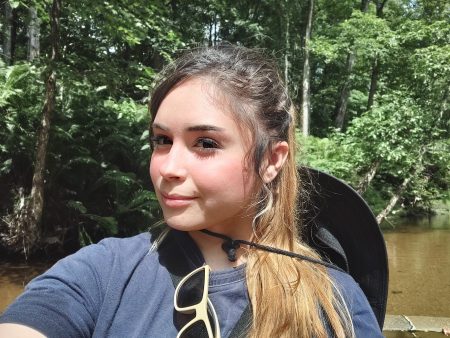
Any other advice?
Don’t let your past dictate your future.
Regardless of your family’s situation, finances, previous bad grades, struggles with mental health, or any other hardships you have faced, we are lucky to have the intelligence and value to achieve anything we are passionate about. As a teenager that lost my dad to suicide, there were many times that I considered the same and never anticipated having any sort of future. It is not an easy road to overcome these obstacles but once you do, overcoming these experiences has immense value in shaping who you are and what you can offer to the world.
My other piece of advice is to not take things too seriously. Enjoy your undergrad and have fun learning. Having a positive outlook on the things you are learning makes learning so much easier! It also helps when you have fantastic professors like Claire, Brigitte, and Sarah.
What will your next few years look like before you graduate from vet school?
Only a few weeks after I graduated from Tech, I moved out to Ithaca, New York to start my veterinary career at Cornell. The vet school curriculum does not start until August but this summer I will be doing veterinary research on fish farming in Lake Victoria, Kenya. At the end of this program, I will be presenting my research at the National Veterinary Scholars Symposium in Puerto Rico.
Beyond this project, I hope that my research aspirations will allow me to participate in a program called Expanding Horizons in my future veterinary years, which would fund a trip to an underdeveloped country. There I would work with a veterinarian to research and combat the issues their country’s veterinary medicine faces. My ultimate goal is to do a PhD during vet school and do more research surrounding aquaculture.
Besides that, this summer I will also be participating in the Dean’s Leaders Program, which is a program that encourages vet students to grow their leadership skills and build up students that come from disadvantaged backgrounds.
After summer concludes, I will officially start vet school. The first two years will be a lot of lectures and labs. Then, in the third year, I will choose a special interest, which will likely be aquatic medicine, and begin doing rotations related to that. I hope to be able to get an internship at a large aquarium during my rotations.
All in all, I am very excited to start my veterinary career. I am entering enthusiastically and with an open mind to have new and exciting experiences.
What do you think you will be doing professionally in ten years?
To be quite honest, I don’t know what I might be doing in 10 years. I love continuously learning and trying new things so I imagine that after I graduate from vet school I will spend time working in many different fields. I’d ultimately like to end up working in aquaculture or aquatic conservation medicine but I’d also like to spend some time in small and large animal medicine, research, and potentially academia. One thing that I know for certain is that whatever I am doing, it will be something that is focused on improving the lives of animals and humans.
About the Michigan Tech Pre-Health Program
The Michigan Tech pre-health program is an excellent entree to a rewarding career in health. We prepare you for graduate health programs like medical school, dental school, pharmacy school, and other allied healthcare professional programs. You receive help navigating the application process and obtaining experiential learning opportunities, like clinical experience. You obtain the prerequisite courses you need to apply. The result — a 70% acceptance rate into all graduate health programs for Tech graduates (nearly twice the national average). Learn more about the student experience on the Pre-Health Blog.
